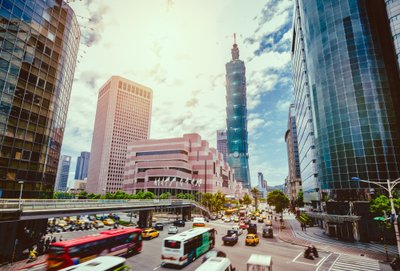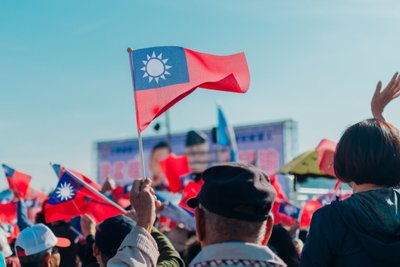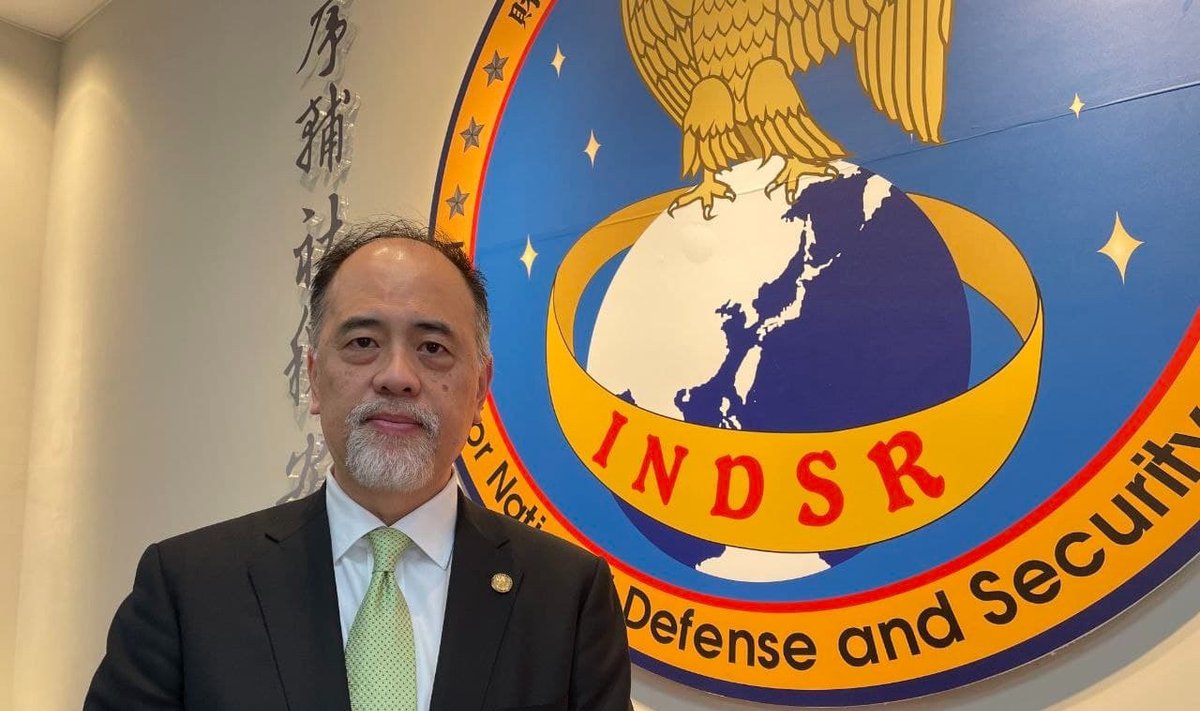What threats are posed to neighbours by countries pumping their military muscle and what can be learned from Taiwan's preparedness for defence? These are the topics covered in an interview with Dr Chen-wei Lin.
– In the Mandarin-speaking world, Taiwan remains the only country where democracy and a multi-party society thrive. How did Taiwan achieve it?
– Oh, dear (sighs, – author's note). I used to teach at a university, and when the lecturer starts talking, it's hard to stop. Taiwan is different from other Mandarin-speaking or ethnic Chinese countries because we believe that people's rights are natural and universal. That is why today we live in a free and democratic country with one of the most advanced economies in the world.
Taiwanese people were talking about universal rights even before 1945, when they were a Japanese colony then. After the countries laid down their arms in the aftermath of World War II, Taiwan was in chaos: hyperinflation was rocketing, and there was no solid legal basis. While most nations in Western Europe and the US were rebuilding their lives in peace, Taiwan fell victim to the Chinese Communist and Nationalist parties.
Taiwan is a small island. But its economy was growing rapidly, and to a large extent that directly depended on the US. In the 1970s, some Taiwanese studied abroad, then returned full of ideas of freedom and democracy, and the awareness that they could live better. That is why everyone – students, factory workers, farmers, university professors – took to the streets to speak up for their rights and freedoms.
The Chinese Nationalist Party (now the Kuomintang, KMT – author's note), which ruled Taiwan at the time, had two options to choose from: either listen to the activists, or crush them and lose the US support. The KMT understood that in order to remain the ruling party, it was more profitable to democratise than to oppress. They chose to do it step by step: as if slicing a sausage, they kept giving the society tiny bits of rights. The most significant changes took place in 1990, under the leadership of the president known as Mr Democracy – Lee Teng-hui. The first national election of representatives was held in Taiwan in 1992 and the election of the President took place in 1996.
– But China still sees Taiwan as a rebel region that needs to be united with the mainland – by force if necessary. Lithuania also suffered decades of Russian oppression, and only through non-violent resistance did it regain its independence 33 years ago. Do you see any similarities in the history of Lithuania and Taiwan?
– It is an honour for Taiwan to be compared to Lithuania. When I visited your country two years ago, I learned a lot about its history – it was once Europe's largest empire. But what inspired me the most were the photos of the heroes who fought for Lithuania's freedom, which I saw in the Seimas. I am amazed by their courage.

Unlike Lithuania, Taiwan has never actually been occupied. But until the end of the 19th century, we were part of the Chinese empire, and for another 50 years we were a Japanese colony. So, although we were not formally occupied, we were ruled by external forces for a long time. In that sense, we are very similar.
– In an interview published in 2021, you said that "Taiwan is dealing with an enemy that is fighting on the physical, psychological and cyber warfronts with much greater resources". How would you describe the diplomatic situation between China and Taiwan today?
– The situation hasn't improved, but it hasn't necessarily worsened either. The visit of the US House of Representatives member Nancy Pelosi to Taiwan in August last year and the massive military exercises organised by the People's Liberation Army, the main military force of the People's Republic of China, in the vicinity of the country, have attracted more attention. Many experts and observers would say that the situation in Taiwan is becoming increasingly tense, but people tend to be more interested in crises than opportunities.
Like Lithuania, Taiwan has never been an aggressor. Our ruling Democratic Progressive Party has, from the very beginning, followed four basic principles in its relations with the People's Republic of China: peace, equality, democracy and dialogue.
The West understands a war when one strikes the other. But war does not always involve the use of weapons and direct damage. The West does not know what propaganda is, those various ways to unbalance you, to make you surrender. We know. You know.
Yes, Taiwan still faces challenges. But when the threat lurks every day, you get used to it and learn to deal with it more effectively. One of the biggest threats to Taiwan remains the information war – fake news that can influence people's thinking and voting choices. When lies started spreading six years ago, people were really shocked. Today, they are immune to it.
– What is your assessment of the recent Chinese military exercises around Taiwan?
– They carry out military exercises of various scales almost daily. I believe that, in doing so, the Chinese are trying to achieve a number of objectives, but one of them has no success at all – to intimidate the Taiwanese people and to isolate Taiwan from the global community. In fact, the Chinese are getting more disgust than admiration from the world for their pro-violence military exercises.
– However, despite China's continued attempts to diplomatically and economically isolate Taiwan from the rest of the world, Taiwan has emerged as one of Asia's major economic players and one of the world's largest producers of computer technology. How did it happen?
– The government's industrial policy plays an important role in Taiwan's economy. It has created opportunities and opened doors for the private sector: subsidies for research and development, an enabling environment for the private sector to become innovative and profitable, and an efficient education system.
One of the things that contributed to our economic growth was the so-called Export Processing Zone. We import machines and materials, manufacture, assemble and ship them to the USA very quickly. This is exactly what Taiwan did between 1960 and 1980. The US role here is both active and passive. The US opened up the world's biggest market for Taiwan. You can produce a lot of things, but if nobody buys them, it's a loss.
The semiconductor industry was also the result of the government's targeted action – it quickly realised that the country had the capacity to export even more. This led to the creation of many research institutes that enabled the private sector to innovate and earn a handsome profit from it. Taiwan's most famous semiconductor company, Taiwan Semiconductor Manufacturing Co., Ltd. (TSM), was one of them. Before starting TSM, Morris Chang ran a government-funded institute for three years.
The private sector developed a new business model and became the world's leading supplier of semiconductors. TSM replaced the previous vertical integration of semiconductors – from design to manufacturing, packaging and testing – with a new model. They concentrated all their capacities on chip production and outsourced design, packaging and testing to other companies.
The trick with semiconductors is that anyone could make them. The problem lies in making money out of it. Profits depend directly on the quality of the semiconductor – it must be good. If one in a hundred chips fails, that's fine. But if 10 out of 100 chips fail, you won't make money. Through years of working with engineers, customers and suppliers, the Taiwanese have accumulated the expertise to ensure that only one or two out of every 10,000 chips fail.
– In one of your previous talks, you mentioned that the Chinese communist system can be seen as much more effective in creating economic development, but there are many areas where it does not work, such as in the protection of human rights. Here I see similarities between China and Russia. Do you see this parallel too?
- Compared to Russia, China has a very large economy. China's economic system may seem efficient at first glance, but those who dig deeper realise that it is not. For example, building a factory in a democracy has to comply with many environmental requirements. This takes a lot of the investor's time, energy and sometimes money. Factories in China or Russia are faster and easier to set up because they are not concerned about the environment, but about money alone. The authorities ignore environmental requirements, and the first to pay the price are local residents and workers.
In 1960, the world was full of authoritarian regimes. The middle class, the white-collar workers and the urban population supported it because they wanted stability and economic growth. At the same time, workers and farmers felt exploited and went on strike in the streets. The society was chaotic. And here comes a leader who says he will bring the order back to the people. Who then supports the army? City dwellers and white-collars.
China is ruled by the largest party in the world – the Chinese Communist Party. Their control over society is very strong. I think there are still people in China who are very supportive of the authorities. But if China started a war that would weaken its economy and kill Chinese sons, I don't know how many people would continue to support Xi Jinping. Hardly would it be enough for Chinese mothers to receive a shaver as compensation for the loss of their children, as it happens Russia.
- Does Russia's aggression against Ukraine mean anything to Taiwan?
- Oh yes, it has a very strong impact on the people of Taiwan. If I were Chinese President Xi Jinping, I would blame Putin for the war in Ukraine, because many peaceful Taiwanese have suddenly woken up to the reality of war. That dictatorships and authoritarian regimes can use war to try to achieve groundless ambitions.

When Russia invaded Ukraine, brave Ukrainians showed the world that they are ready to pay a very high price for their freedom and democracy. Again, this has a big impact on Taiwanese society. We have had a lot of discussion about asymmetric warfare in my country, but before the war in Ukraine, people did not really understand what it meant. Suddenly, they see Stingers and Javelins tearing through Ukrainian skies on their TV screens. And then they realise that a single missile can blast a clunky tank off the ground.
Of course, China also does not miss the opportunity to keep nagging Taiwan with the question of whether we want to be in Ukraine's shoes, or whether we would prefer to accept the communist principle of "one country, two systems" after all.
- What future threats, if any, do you see for countries neighbouring Russia and China?
- I have never been a dictator, I don't like them, and I don't really know what dictators think. But whatever they think, they do not think wisely, because they only gather enemies around them.
We shouldn't be afraid of Russia or China. Those who fear can lose their freedom at once. But if we don't want to fight, we need to be prepared better. On the other hand, some governments are still learning how to communicate with each other. They are learning how to communicate with their people. A government must first earn the trust of the people. People need to know that the government is doing the right thing, that the authorities understand their actions, are accountable for them and ready.
30 years ago, this interview wouldn't have happened. Unlike back then, today we have every opportunity to communicate and cooperate. Sharing information and cooperation is our daily routine, and we need to make the most of it to be better prepared. Because by staying in close contact, we are already one step ahead of any threat.
